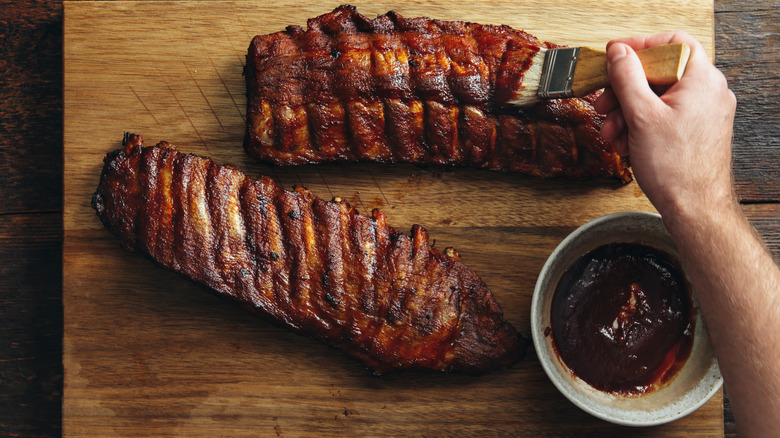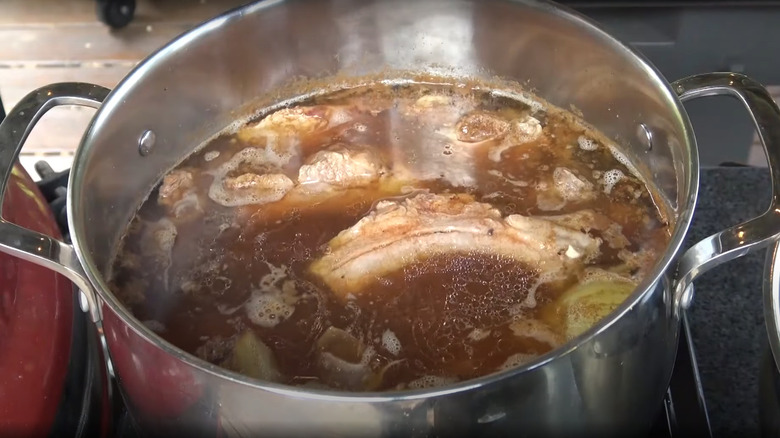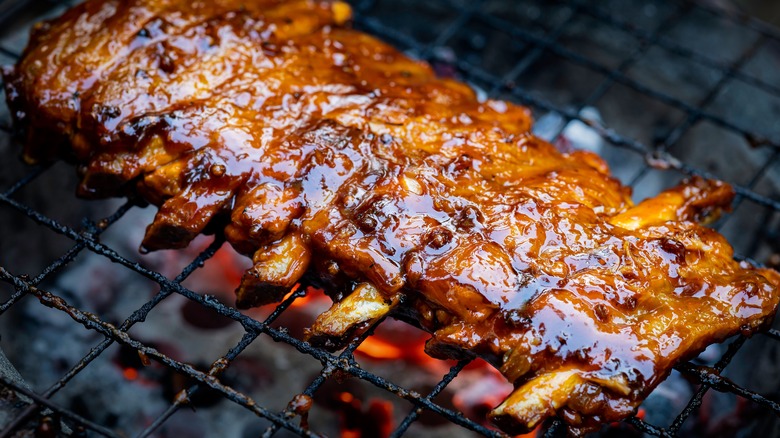Why Boiling Ribs Before Grilling Them Is A Game-Changer
No matter what the style of American barbecue, ribs often feature as a star player. Whether it's a rack of baby back ribs, spare ribs, or St. Louis-style ribs, nothing beats the smoky taste and succulent, fall-off-the-bone texture you get from grilling. While there are many tips for cooking ribs, they tend to benefit from a low and slow approach to get the best results. And for the most tender, melt-in-the-mouth meat every time, it's well worth simmering the ribs before they hit the grill.
There are several benefits to this two-stage cooking method. It renders out some of the fat from the meat and makes the connective tissue softer. This means you get a more tender texture to the pork. And it also gives a quicker result than cooking raw, as the ribs are already partly done before they are finished on the grill.
If you want to parboil ribs before grilling them, there are a few key steps to follow to ensure the pork remains as moist and flavorful as possible. They involve paying attention to both your technique and the timing.
Parboil before grilling for tender and tasty rib meat
Ribs can be tough and fatty if not prepared and cooked properly. Partially cooking the ribs in water means that some of that fat from the surface of the meat is removed since it renders into the liquid. It also acts to gently soften the tougher tissues before the meat is then finished on the grill for a tasty charred flavor. And as a bonus, the time spent in the water makes it easier to remove the chewy skin and membrane from the ribs before they go on the grill.
If you're worried about some of the rich taste of the meat also leaching out into the water along with the fat, then take the opportunity to add extra flavor to the simmering liquid by incorporating spices or other aromatics. You can add vegetables such as onions, carrots, and celery as well as a variety of seasonings. Robustly flavored additions such as garlic powder, onion powder, or paprika will add extra depth as well as an appetizing aroma. Better still, skim and strain the liquid when you're done simmering for a tasty broth.
To ramp up the taste further, try using meat broth, beer, or cider as the cooking liquid. Adding a splash of orange juice to ribs as they simmer will also help impart a delicious sweet yet tangy flavor. Or add some barbecue sauce to the water for extra smoky or spicy notes.
Slow simmering gives a superior texture to the meat
The key to cooking ribs before barbecuing them is to not actually boil them. Just like when grilling, you want to embrace a low and slow technique that provides the best texture — and this is achieved by using simmering rather than boiling. It means the resulting meat is more likely to develop a tender texture rather than become tough or overcooked — like it can if cooked at a roiling boil.
Once you've reduced the liquid in your pot to a simmer and added the ribs, it's worth skimming off any foam that rises to the top after a couple of minutes. Then slowly simmer the meat for around 45 minutes to an hour, depending on its size. Once the ribs are tender, remove them from the cooking liquid, and pat them dry before grilling them. Use the leftover liquid to boil some collard greens, corn on the cob, or even macaroni for a flavorsome pasta salad.
Since the pork is already on its way to being cooked through, it will require a significantly shorter spell on the grill than if it were being cooked raw. Give the ribs around 15 minutes on a pre-heated and oiled grill, with regular saucing to develop a tasty char and smoky flavor. The meat should reach an internal temperature of at least 145 degrees Fahrenheit and rest before being served (per the USDA).



